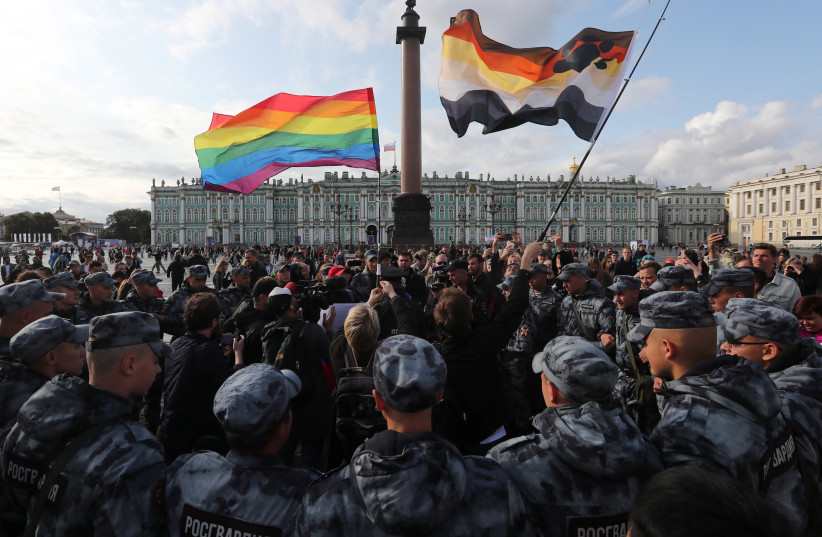Russia's parliament approved on Thursday a bill that widens a prohibition of "LGBT propaganda" and restricts the "demonstration" of LGBT behavior, making any expression of an LGBT lifestyle almost impossible.
Under the new law, which still needs the approval of the upper house of parliament and President Vladimir Putin, any action or information that is considered an attempt to promote homosexuality - whether in public, online or in films, books or advertising - could incur a heavy fine.
Previously, the law had outlawed only the promotion of LGBT lifestyles aimed at children. The new bill also bans the "demonstration" of LGBT behavior to children.
Lawmakers say they are defending traditional values of the "Russian world" against a liberal West they say is determined to destroy them - an argument also increasingly being used by officials as one of the justifications for Russia's military campaign in Ukraine.
Authorities have already used the existing law to stop gay pride marches and detain gay rights activists. Rights groups say the new law is intended to drive so-called "non-traditional" LGBT lifestyles practiced by lesbians, gay men, bisexuals and transgender people out of public life altogether.

"Hybrid Warfare"
"LGBT today is an element of hybrid warfare and in this hybrid warfare we must protect our values, our society and our children," Alexander Khinstein, one of the bill's architects, said last month.
Legal experts said the vagueness of the bill's language gives room for law enforcers to interpret them as broadly as they wish, leaving members of the LGBT community in a state of even greater uncertainty.
Kseniya Mikhailova of the LGBT support group Vykhod ("Coming Out") said adults-only gay bars or clubs would probably still be allowed to function, although perhaps not to advertise, but that same-sex kissing in public might be taken as an infraction.
And she said same-sex couples would begin to fear that their children might be taken from them on the grounds that they were having an LGBT lifestyle demonstrated to them.
The law stipulates fines of up to 400,000 roubles ($6,600) for individuals and up to 5 million roubles ($82,100) for legal entities. Foreigners could face 15 days of arrest and subsequent expulsion.
Mikhailova said the original ban nine years ago on LGBT "propaganda" towards minors had triggered a wave of attacks on the LGBT community, and that it could now expect a "tsunami" because the amendment in effect "says the state is not against violence towards LGBT people".
Political scientist Ekaterina Schulmann said the law aimed to prohibit anything that showed LGBT relations or inclinations to be "socially acceptable" or "equal to so-called traditional family relations or sexual relations".
"People - authors, publishers, just people - will think twice before even mentioning anything related to LGBT," she said in an interview from Cologne, Germany.
Schulmann said the bill was also a "huge win" for the communications regulator, Roskomnadzor, which had already "assumed the powers of a political police" and now had the authority and responsibility to monitor all kinds of information in search of LGBT propaganda.
The video-sharing app TikTok was fined 3 million roubles last month for promoting "videos with LGBT themes", while Russia's media regulator asked publishing houses to look at withdrawing all books containing "LGBT propaganda" from sale.
